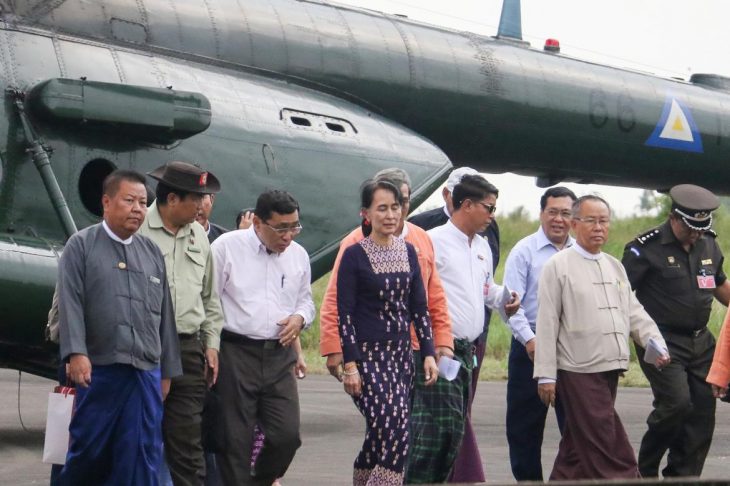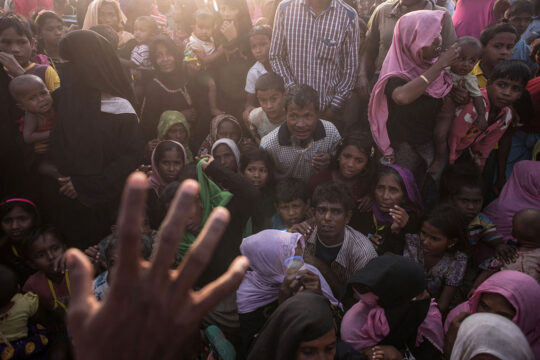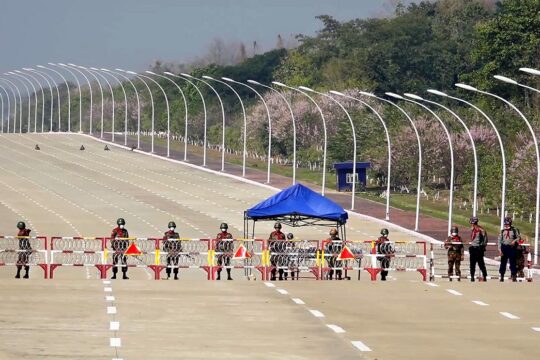Myanmar's de facto leader Aung San Suu Kyi travelled to Rakhine State this month on her first visit there since taking office. The November 2 trip took her to Sittwe, and to Maungdaw Township in northern Rakhine, where she met Rakhine and Muslims affected by the violence that has resulted in more than 600,000 Muslims fleeing to Bangladesh. At a time when the US and European Union are considering targeted sanctions against senior army officers over the operation launched in northern Rakhine after the Arakan Rohingya Salvation Army attacked security posts in late August, Suu Kyi is trying to convince the international community that she is working hard to solve the crisis.
Last month she established the public-private Union Enterprise for Humanitarian Assistance, Resettlement and Development in Rakhine, which she chairs, and to which prominent business people have donated nearly K17 billion (about US$12.4 million).
It’s her second initiative in regards to Rakhine State, after the appointment last year of a commission headed by former United Nations secretary-general Mr Kofi Annan to propose sustainable solutions to conflict, displacement and underdevelopment in the state. Its final report, containing 88 recommendations, was released in Yangon on August 24, hours before the attacks by ARSA triggered the latest crisis. Despite the state counsellor’s concerted efforts, will the appointment of UEHRD be able to solve the Rakhine crisis and what challenges is she likely to encounter?
The first challenge involves negotiations with Bangladesh over the return of the hundreds of thousands of Muslim refugees. There are already indications that the negotiations will be difficult. The visit by the Bangladeshi Home Minister Mr Asaduzzaman Khan last month for talks with his Myanmar counterpart, Lieutenant-General Kyaw Swe, made little progress on the repatriation issue. Myanmar said the talks had produced agreement on a 10-point statement. Dhaka said later that a statement agreed at the talks and subsequently released by Myanmar had deleted references to Annan commission recommendations about the return of refugees.
State Counsellor’s Office spokesperson, U Zaw Htay, said on November 1 that Myanmar was ready to begin repatriations based on a bilateral agreement reached in the 1990s after an earlier exodus of Muslims from Rakhine to Bangladesh. He suggested that Bangladesh was delaying negotiations on repatriation because of the millions of dollars promised by the international community to aid the refugees sheltering on its side of the border. Bangladesh has accused Zaw Htay of being “ill informed” about the process. Negotiations over repatriation will be intense and fraught, with more disagreement likely.
Funding resettlement and changing attitudes
The second challenge facing the state counsellor is financial and involves the cost of relocation and resettlement in northern Rakhine. On October 23, the United Nations said it had received pledges totaling $344 million in response to an appeal for $434 million to provide aid for 1.2 million people in Bangladesh, including arrivals from earlier violence. The UN appeal was for aid until the end of February.
However, the UEHRD project is not temporary and is aimed at providing for the permanent resettlement of refugees in northern Rakhine and the area’s development. It is obvious that the cost of implementing UEHRD will be considerably more than the $12.4 million pledged by a group of wealthy businessmen. Where will the extra money come from to implement UEHRD? Unless Aung San Suu Kyi is able to attract financial support from the international community, it will be difficult. However, Myanmar may find the conditions of such assistance unacceptable.
Another challenge is the attitude of the Tatmadaw (army) towards the Muslims in northern Rakhine whom it calls “Bengalis”. Tatmadaw leaders have said repeatedly that the Muslims in northern Rakhine are descendants of labourers brought into the country during the British colonial period and are not natives of Myanmar. The attitude that “Bengalis” are not entitled to citizenship has informed the view that the government is not responsible for them and there is no need to develop the areas where they live.
Because of this policy by the Tatmadaw and the Ministry of Home Affairs, northern Rakhine, where the population is 95 percent Muslim – or was before the latest violence – is very poor and lacks even basic infrastructure. The poverty and lack of development also affects the Rakhine and smaller indigenous groups who comprise the balance of the population. Aung San Suu Kyi’s determination to bring development to northern Rakhine means that the Tatmadaw and Home Affairs will need to change their attitude, otherwise they could pose a challenge to the smooth implementation of the UEHRD project.
Yet another big challenge for the State Counsellor is the attitude of the Rakhine, including the state’s politicians. Most of them believe that Rohingya Muslims are illegal immigrants; since August 25 they have been accusing them of supporting terrorism. They oppose providing aid to Muslims and have blocked its delivery. Among the many challenges Aung San Suu Kyi faces for her efforts to succeed is changing the entrenched attitudes of Rakhine political leaders.
This article was first published by Frontier





